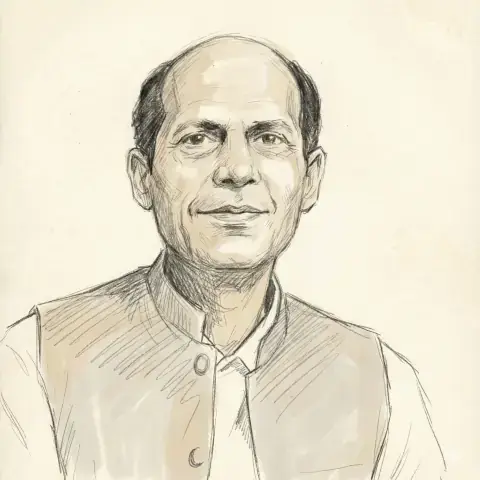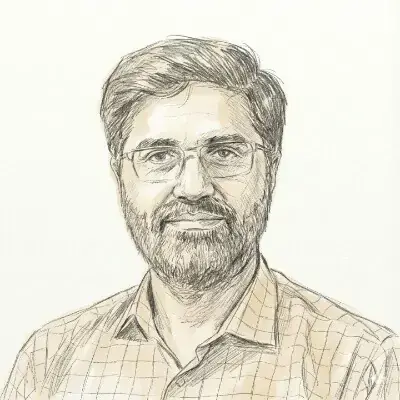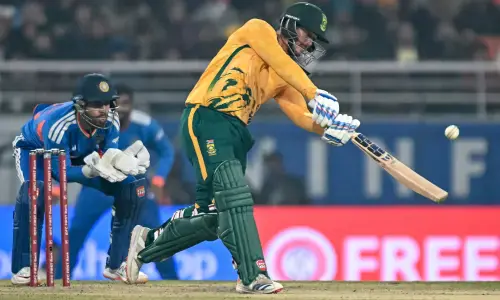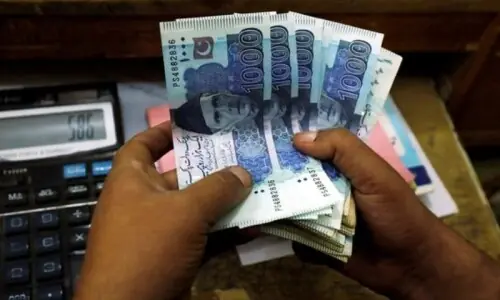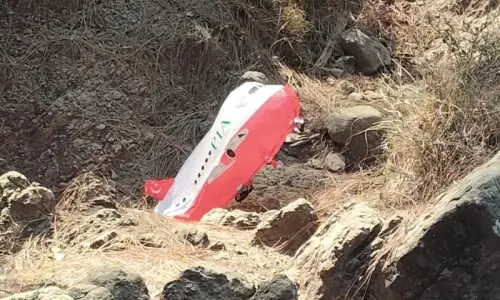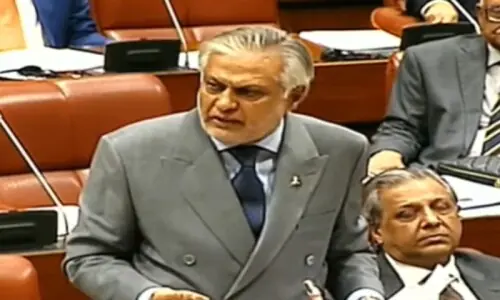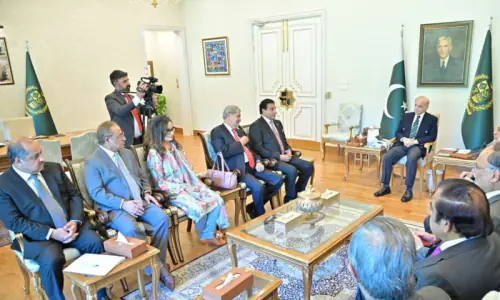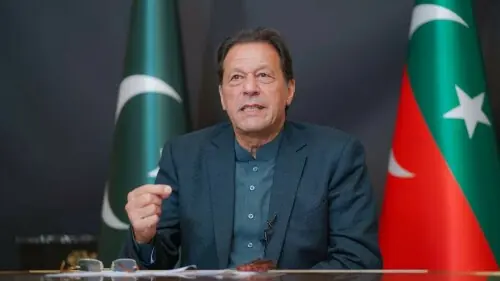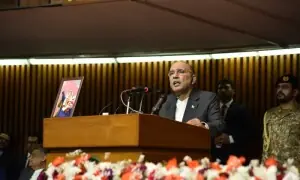
• PTI claims it can form govt in centre, two provinces
• Barring Karachi, PPP seems set to retain its hold in Sindh
• PML-N doing better in central Punjab, some other areas
ISLAMABAD: Despite an underlying ‘distrust’ in the electoral exercise, millions queued up to vote in Thursday’s long-overdue elections.
However, voters’ hopes of seeing some results were left unfulfilled till late in the night, with the Election Commission of Pakistan (ECP) only able to announce three results by 4am on Friday morning.
According to the ECP, Fazal Hakim Khan was successful on PK-6 Swat-IV with 25,330 votes; Sami Ullah was successful on PK-76 Peshawar-V with 18,888 votes; and Ali Shah was successful on PK-4 Swat-II with 30,022 votes. All three were independent candidates backed by the PTI.
Citizens mostly had to rely on various private television channels relaying unofficial, tentative results based on proprietary sources.
Earlier in the day, voters, both young and old, had started queuing up shortly before 8am outside the 90,000 polling stations designated for the polls, eager to discharge their civic duty. Many more would turn up over the course of the day. More than 128 million were eligible for exercising the right to franchise in what had been described as the ‘largest’ elections in the country’s history.
Events appeared to be poised to take an unexpected turn, with the frontline contender in this election, the PML-N, going silent and its leaders nowhere to be seen, while TV channels depicted independent candidates leading on most of the seats on the basis of initial counts.
Though voters who spoke to the media had, in general, been positive that their choices would count, trends on social media platform X later in the day suggested that apprehensions that the counts may be rigged were taking root.
The situation on Thursday night seemed quite similar to the 2018 general election, when the infamous failure of the ECP’s Results Transmission System (RTS) had caused a similar stoppage in reporting of results after the close of polls.
Voting was held for 265 out of the total 266 general seats of the National Assembly and 590 out of 593 general seats of the provincial assemblies. An unprecedented bulk of the voters belonged to the youth demographic, and it had been widely predicted that their vote may spring a surprise.
Polling had mostly commenced on time and continued largely without incident till 5pm. In an informal chat with reporters, Chief Election Commissioner Sikandar Sultan Raja said time extensions were granted at three polling stations in Gujarat upon the relevant ROs’ requests. He also claimed no citizen had faced any hindrance in casting their vote, but voter accounts from across the country indicated otherwise.
With tensions running high and bitter divisions between the contenders, the presence of police and paramilitary personnel seems to have helped avert a large breakout of polling day violence, although some isolated incidents did spoil an otherwise peaceful day. Around 650,000 security forces had been deployed for poll duties, including 137,000 army men and paramilitary troops and 511,000 police personnel.
As is now custom, national media kicked off the race to report results promptly after the 6pm embargo expired. After an initial burst of activity, which showed the PTI-backed independents leading most races in early counting, the reporting of polling station-wide results ground to snail’s pace. Some TV channels also adjusted the counts that were initially reported, adding to the confusion.
Early signs of result
Even PPP chief Bilawal Bhutto Zardari tweeted: “Results are incredibly slow coming in.”
However, he tinged his remarks with some optimism, saying: “PPP candidates and independents whom we have supported/engaged with seem to be doing well!”
Cold weather and mobile service outages had an early impact on the polls. While it is too soon to call the race for any party, PTI-backed independents seemed to be in a better position than all other parties.
In the small hours of Friday morning, PTI Central Secretary Information Raoof Hasan claimed that his party was leading on at least 125 National Assembly seats “by huge margins”, Dawn.com reported.
“In due course of time, we shall be in a position to form governments at the centre and at least two of the four provinces,” he said in a video message posted on party’s X account.
He thanked people for reposing their confidence “in the leadership of Imran Khan”.
The PML-N did better in Punjab and some other places. In Sindh, the PPP seems set to retain its hold, while no party has a clear lead in Karachi.
Previous predictions
Earlier, observers had predicted a low turnout based on the lacklustre campaigns run by parties, as well as the three consecutive sentences handed to former prime minister Imran Khan, which many expected would discourage voters. However, due to the delay in the tabulation of results, it was difficult to say how many turned out.
The Pakistan Tehreek-i-Insaf had been the target of sustained crackdown in the days and weeks preceding the election, with candidates reporting suffering from a host of issues, including the rejection of their nomination papers, abductions, police crackdowns and state authorities’ denial of permission for organising campaign-related activities.
Its voters, however, seem to have remained defiant despite the party’s victimisation, which many poll observers had described as a concerted effort to suppress the PTI’s vote. Based on the initial counts run by various television channels, the PTI seemed to be in prime position to spring a major upset, with its candidates leading in Khyber Pakhtunkhwa and in an unexpected number of seats in Punjab.
The PML-N and its supreme leader, Nawaz Sharif, who had been keen to return as fourth-time prime minister, did not look confident about their prospects late on Thursday, with reporters present at their election cell were quietly told to return the next day. Mr Sharif’s party had earlier been tipped as the favourite in the race, based on the general impression that they enjoyed the blessing of the country’s all-powerful establishment.
Candidates expelled
There were complaints by PTI-backed candidates that returning officers had expelled them from their offices without assigning any reasonable excuse and without giving them signed results (Form-46) on the basis of the Form-45 they had received from their presiding officers.
“Following a suspicious incident at the RO’s office, I have been illegally evicted from the premises. The process of compilation of results cannot proceed in my absence. I must be allowed back in,” said PTI-backed candidate for NA-128 Salman Akram Raja in a post on social media platform X, formerly Twitter.
But the ROs were quoted as saying that they were sending the compiled results directly to the Election Commission “under revised instructions”.
This was contrary to the announcements made by the ECP earlier in the day, in which ROs were told to paste signed results outside their offices and transfer the same to the ECP if and when the internet facility was available.
Under the given plan, the election authorities were also supposed to set up an election result wall at a big screen at Town Hall in Lahore. But the promise did not materialise.
Published in Dawn, February 9th, 2024

